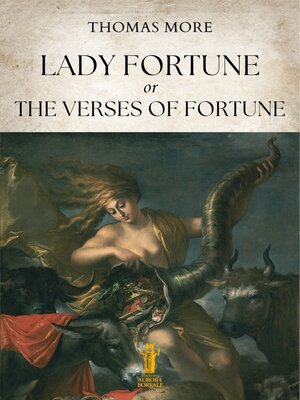
Sign up to save your library
With an OverDrive account, you can save your favorite libraries for at-a-glance information about availability. Find out more about OverDrive accounts.
Find this title in Libby, the library reading app by OverDrive.



Search for a digital library with this title
Title found at these libraries:
| Library Name | Distance |
|---|---|
| Loading... |
Sir Thomas More (1478-1535), venerated in the Catholic Church as Saint Thomas More, was an English lawyer, judge, social philosopher, author, statesman, theologian, and noted Renaissance humanist. A Rosicrucian initiate, according to Italian scholars Paolo Rumor and Diego Marin, he was affiliated with one of the most powerful and secret initiatory organizations of all time.
More served Henry VIII as Lord Chancellor from October 1529 to May 1532, and is best known for writing Utopia, published in 1516, considered the first Rosicrucian manifesto, a work describing the political system of an imaginary island state, in which many have seen anticipations of the basic principles of modern Freemasonry.
Sir Thomas More's Lady Fortune, often called The Verses of Fortune, dating back to the early 16th century, is a philosophical dialogue dramatizing human struggle against the "allure of Fortune's fleeting goods". The dialogue depicts Lady Fortune and a wise interlocutor discussing how to achieve true "happiness" by choosing "happy Poverty" and focusing on what "nature can support", rather than being influenced by wealth and power.
In the opinion of many historians and literary critics, this work was likely intended as a preface to an early English version of a book on lottery, with the aim of advising readers not to take games of chance too seriously. Instead, it is a work with profound philosophical, ethical, and initiatory meanings.
More served Henry VIII as Lord Chancellor from October 1529 to May 1532, and is best known for writing Utopia, published in 1516, considered the first Rosicrucian manifesto, a work describing the political system of an imaginary island state, in which many have seen anticipations of the basic principles of modern Freemasonry.
Sir Thomas More's Lady Fortune, often called The Verses of Fortune, dating back to the early 16th century, is a philosophical dialogue dramatizing human struggle against the "allure of Fortune's fleeting goods". The dialogue depicts Lady Fortune and a wise interlocutor discussing how to achieve true "happiness" by choosing "happy Poverty" and focusing on what "nature can support", rather than being influenced by wealth and power.
In the opinion of many historians and literary critics, this work was likely intended as a preface to an early English version of a book on lottery, with the aim of advising readers not to take games of chance too seriously. Instead, it is a work with profound philosophical, ethical, and initiatory meanings.







